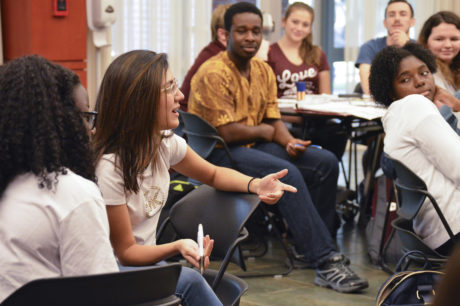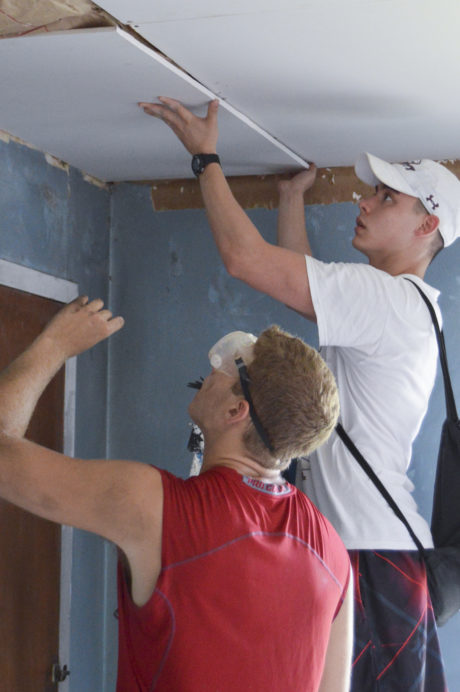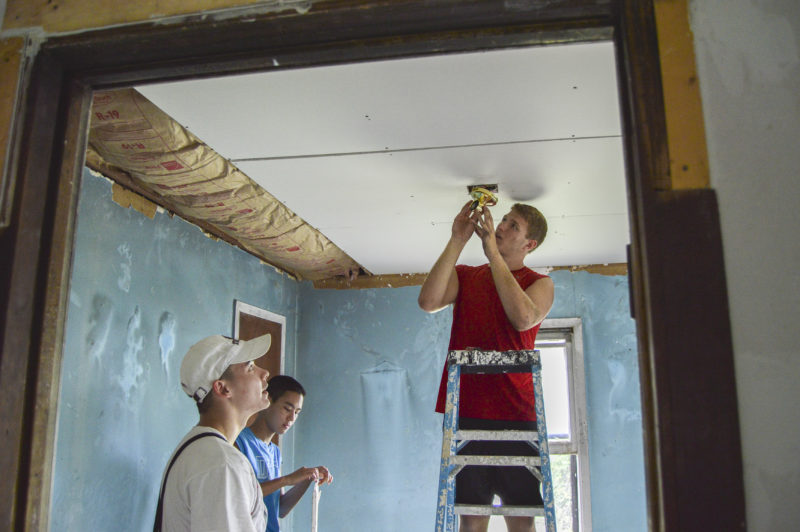Each year, Trinity first-years who participate in the Bridge or Plunge programs move in before New Student Orientation (NSO), providing them the opportunity to acclimate to campus and San Antonio before the arrival of the rest of the first-year class. Participants are able to bond with other students in the program, returning student mentors and faculty before the beginning of the academic year.
The Summer Bridge Program is for first-generation, underrepresented students (FGUS) and students who are Pell Grant-eligible. Students arrive almost two weeks before NSO to get a head start on their First-Year Experience (FYE) course, A Successful Life, which is designed specifically for FGUS students.
The program was started at Trinity by Sheryl Tynes, vice president for student life, and in 2015, Stacy Davidson, director of the Student Success Center, took over the four-year-old program.
“The program helps students with getting connected with their faculty early and getting that resource and support as they navigate through the school year. That class is the only thing they have to focus on,” Davidson said.
Davidson explained that research by Tynes suggests Bridge programs for FGUS students provide the help needed to succeed next to peers from families with college graduates.
“These students do as well as, if not better than, students who aren’t first generation in the areas of retention, graduation and GPA,” Davidson said.
In 2016, Davidson added a component to the program that she refers to as “Welcome to the Academy,” which gives the students the skills they need to be successful in their FYE as well as future classes.

“”˜What does college look like? How can I be a successful student? What’s different about college? What skills will I need to reach my potential?’ We frontload the program for them so that they have the skills that they need,” Davidson said.
Another important resource provided for participating students is their peer tutors, who act more as mentors, especially during the first two weeks.
“The peer tutors move in early with them as well, and we ask them to sort of serve as like the residential advisor until the residential advisors are trained,” Davidson said. “There will also be a panel of former FGUS students so they can ask questions and get advice.”
Tori Marshall is a sophomore peer tutor who went through the program last year.
“I decided to participate this year because I felt that I benefited so much from my experience last year that I’d love to help other first-years have such a great experience,” Marshall said. “The benefit of moving in early is it allows students to familiarize themselves with the campus and all its resources before classes start, to make connections with other students and to transition from high-school level classes to college classes.”
Sophomore Cindy Chiev participated in the Summer Bridge Program in 2016.
“I’m from out of state, so I thought this opportunity would be beneficial so I could get used to the campus before everyone else moved in,” Chiev said. “I gained a lot of friends that had the same experience as me. Even if the course itself wasn’t that great, the friends you make are definitely worth while.”
The Plunge program also allows first-year students to move in early; however, the program is open to all incoming first-years for a $100 fee. University chaplain Stephen Nickle started the Plunge program in 2001 as a way to connect incoming students who value faith and service.
The program is not based in Trinity’s academics, but rather its community. Like Bridge, the Plunge connects first-year students with those who have similar interests and backgrounds “” in this case, their relationship with God and passion for service.
Incoming Plunge participants and veteran mentors move in the Sunday before NSO begins and engage in a five-day, off-campus mission event, where they combine service projects with worship, fellowship and exploring San Antonio. Although participants are allowed early access to their dorm room, they stay off campus for the week of Plunge.

“I wanted to understand how faith informed and motivated their yearning to be of service, and to see how serving “” volunteering, in particular “” nuanced their faith, and how they make meaning of the lives they were living,” Nickle said.
Nickle speaks highly of the veterans that return to the program as a mentor, such as junior Christiana Ellard.
“Ever since I attended the Plunge as a first-year I have become very attached to the program because of the amazing foundational relationships I fostered, which continue to grow and challenge me to this day,” Ellard said. “I continue to lead the Plunge every year because my goal is to have the first-years have as great of an experience as I did. I felt an incredible sense of comfort and made friends quickly because everyone is so welcoming. It was also easier for me to integrate myself into campus life because I had role models to look up to.”
The program benefits not only the incoming first-years, but the veteran students as well.
“As a veteran I have benefitted from the Plunge because it continues to grow me as an individual because I am able to mentor younger students. I end up learning more about myself through the advice I give and the things I am able to teach,” Ellard said.
One first-year participant this year is Sara Kate Phelps, who saw the Plunge as an opportunity to make friends before the first day of NSO while also serving the community.
“I’ve gained a better understanding of service, of my relationship with God and a deeper appreciation for what I have,” Phelps said.
The Plunge program provides an introduction to the Trinity community that allows first-years to feel comfortable before the stress of the semester begins.
“I was expecting to feel the same anxiety and worry about my appearance and actions that I had in middle school and high school, but I haven’t,” Phelps said. “Everyone that I’ve met so far has surpassed all expectations I had of people and I’m so glad I’m surrounded with such a great group of people.”







